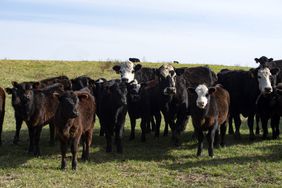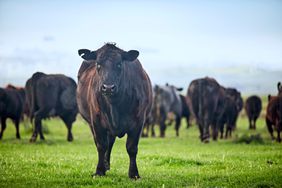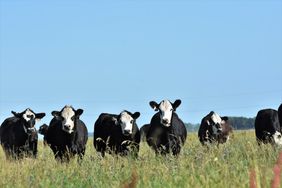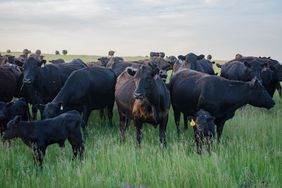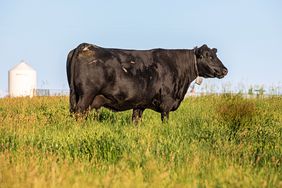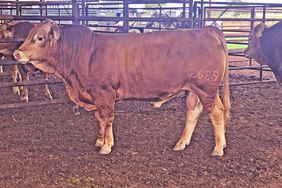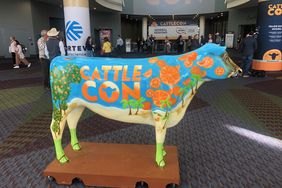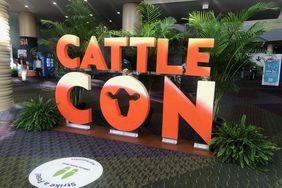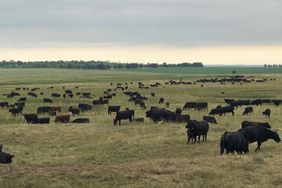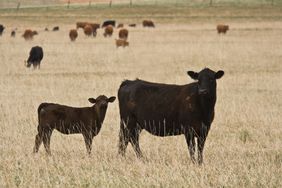:max_bytes(150000):strip_icc()/29764_Todd20Wilkinson-2-ea1542c8ff2c4f83b1bba9a5dd669f92.jpg)
Todd Wilkinson, 2023 president of the National Cattlemen's Beef Association (NCBA), represents cattle ranchers across the country and in the nation's capital. He has practiced law for more than 38 years and been involved in NCBA both locally and nationally, but his favorite activity is being outside and working cattle on his farm near De Smet, South Dakota.
SF: Tell us about your farm and cattle operation.
TW: Wilkinson Livestock is around 1,800 acres about 45 miles west of Brookings, South Dakota. It's a combination of corn, soybeans, pasture, and hay, with about 350 Angus-based commercial cows. We also run some stocker cattle and a feedlot. Some of our cattle go to a feed yard in Nebraska for Walmart's Prime Pursuits program. Farming with my son, Nick, is one of the real joys in my life.
SF: What are the strengths of your cattle operation?
TW: I'm proud of our success with calving. We start heifers in late February and have a very tight calving window. We'll get 240 calves in about 40 days. We do most of it in two calving barns, one that can hold 18 pairs, the other 14, and we have an overflow barn if needed. As soon as calves are up and doing good, we get them outside to make room for more.
Nick spends a lot of time with the cows in calving season, and we have extremely low calf losses. Last year, in fact, we had a few sets of twins and ended up with a net of plus-two calves [more calves than cows]. Nick is really good at spotting problems early and taking action.
I'm also proud that we're fully BQA [Beef Quality Assurance] trained. When I was growing up, there was a whole lot of hollering when we worked cattle. That's all changed for the better.
SF: How do you achieve such a tight calving window?
TW: We use a heat-sync system to bunch cows, and we breed by artificial insemination. We ultrasound cows after the breeding season and cull those that aren't in the window.
SF: Were you affected by drought last year?
TW: We had five dugouts go dry last summer. It's the first time ever that has happened. We had some good snow this winter, and we hope that's a good sign of more moisture coming. We're eternal optimists out here. I'm about to buy a few more heifers, so I hope my optimism pays off.
SF: What's your advice to those considering a career in the cattle business?
TW: Everyone's opportunity is going to be a little different. If you are starting on your own, I would say don't be afraid to start small. The cattle business is a place you can do that and grow over time. Maybe you can lease some land, or get a job on a ranch and work your way up with some sweat equity.
Don't be afraid to supplement your income elsewhere while your farm is small. Too many people want to start out too big, too fast. Good things take time.
SF: What do you hope the cattle business will look like in 10 years?
TW: I hope we're watching a transition from people like me, 64 years old, to younger producers. I hope we can keep them engaged in farming as a good life and a good place to raise a family. They have to see it as something sustainable, and a part of that is financial. If they can't see that, that makes me worry. I have nine grandkids, and I hope some of them have an interest in farming and see an opportunity there.
SF: Do you have any pet peeves when it comes to farming?
TW: Not really. Maybe it's people who like to complain about things, yet aren't willing to do anything. Rather than complain, I'd rather advocate. That drives my NCBA involvement.
My dad was my hero. He instilled a strong work ethic into me and my siblings. He had a way of talking with people that could bring solutions and not just conflicts. That's what I hope I can do in my role, and find ways to make things better for everybody. It's incumbent on anyone in a leadership position to do that.
SF: What's a really good day for you?
TW: I enjoy getting outside and working cattle. That's relaxing, and I can clear my head. A good day of working cattle gives me a sense of accomplishment. Of course, that's if everything goes right. If it doesn't, it can also be a really bad day!
